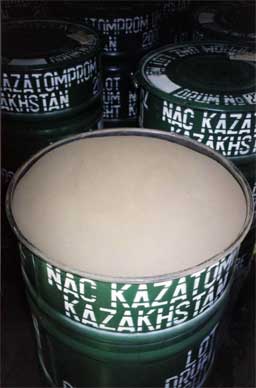(Reuters) – Kazakhstan increased its uranium output to around 19,000 tonnes last year from 17,803 tonnes in 2010, the industry and new technologies ministry said in a statement on Thursday, citing preliminary data.
 The Central Asian nation had originally planned to raise uranium output to 19,600 tonnes in 2011 to cement its position as the world’s largest producer of the mineral, which is used to produce nuclear fuel.
The Central Asian nation had originally planned to raise uranium output to 19,600 tonnes in 2011 to cement its position as the world’s largest producer of the mineral, which is used to produce nuclear fuel.
Kazatomprom head Vladimir Shkolnik had said earlier that Kazakhstan aimed to boost its uranium output further to 20,000 tonnes in 2012. State nuclear company Kazatomprom is Kazakhstan’s largest uranium producer. But Deputy Industry and New Technologies Minister Albert Rau said on Thursday the country would probably maintain its 2012 uranium output at last year’s level. “Taking into account the current condition of the market, there is no reason to increase output,” he told reporters without elaborating.
Kazakhstan has 15% of the world’s uranium reserves (second only to Australia’s) and an expanding mining sector. In 2009 it became the world’s leading uranium producer, with almost 28% of world production, and then 33% in 2010. Their only nuclear power reactor which operated from 1972 to 1999, is under desalination. However, Kazakhstan has a major plant making nuclear fuel pellets and aims eventually to sell value-added fuel rather than just uranium. It aims to supply 30% of the world fuel fabrication market by 2015. The government is committed to increased uranium exports, and is considering future options for nuclear power.
Kazatomprom has forged major strategic links with Russia, Japan and China, as well as taking a significant share in the international nuclear company Westinghouse. French, Canadianian and Japanese companies (Areva , Cameco Corp and Sumitomo Corp.) are involved with uranium mining and other aspects of the fuel cycle.

